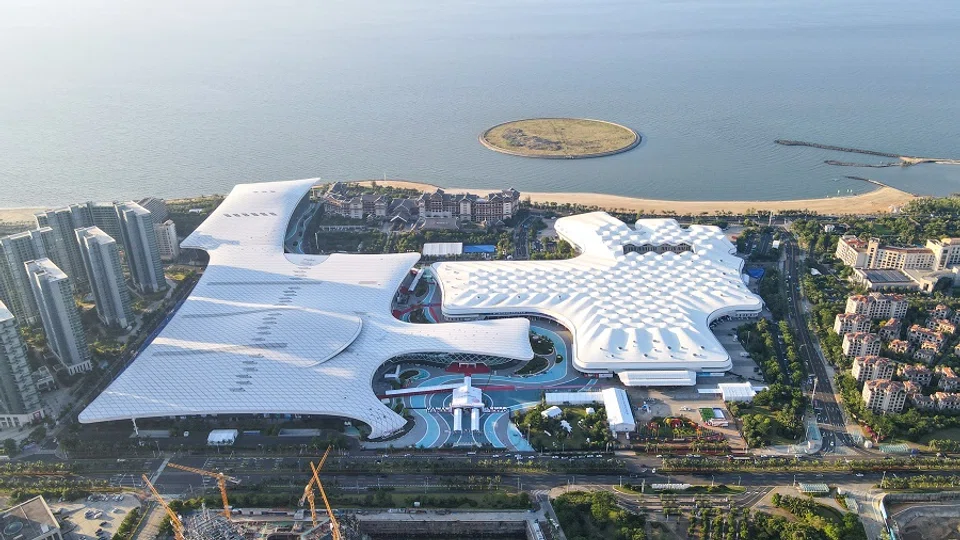Here's how Hainan can become the next financial hub
Hainan is set to become China's first free trade port and has great potential to beef up its financial offerings. Academics Pei Sai Fan and Chen Jingwei present a number of suggestions that could boost the Chinese province's standing as an international hub for financial and regulatory innovations, green financing and connectivity.

China is committed to deepening reform and opening up in Hainan and supporting the construction and trial of the country's first free trade port. To that end, it laid out its proposal in March 2021 in the document "Opinions on Financial Support for Hainan to Comprehensively Deepen Reform and Opening Up".
Released by China's financial regulators, the proposal looked at policy measures in six aspects:
- enhancing the convertibility of the RMB to support the liberalisation and facilitation of cross-border trade, investment and financing;
- improving Hainan's financial market system;
- expanding the opening up of Hainan's financial industry;
- boosting the innovation of financial products and services;
- improving financial services; and
- strengthening financial regulation to prevent and defuse financial risks.
Given the above, how can innovations in financial services and financial regulation live up to their best potential?
Financial innovation in real estate
First, it is well known that Hainan heavily relied on the real estate industry during its 30 years of reform and opening up. It allowed the real estate development model to be skewed, leading to a housing bubble that led to developers fleeing and shuttering. At one point, banks were reporting non-performing loan ratios that exceeded 60%. "Rotten-tail" (unfinished) buildings even made it to Hainan's top three tourist attractions, alongside Tianya Haijiao.

A new round of reforms in 2018, followed by the construction of the free trade port in 2020, strict regulations of the real estate industry with efforts to cut oversupply, and the nurturing of new industries, have provided new growth opportunities for Hainan. It has thus become necessary for finance to support the transformation and upgrading of the real estate industry, and the development of various key industries.
Hainan has to strengthen the financial and risk management of the real estate industry. It can do this by setting up a mechanism to resolve and deal with real estate financial risk, implementing innovative financing models and tools - such as real estate investment and acquisition funds, investment trust (REITs) and the tokenisation of assets.
These will help the industry expand its investor base, promote diversified financing channels, and acquire and revitalise small and medium-sized real estate enterprises with funding issues, as well as see to their market operations.
At the same time, there is also a need to guide the transformation and development of the industry. Measures such as adjusting the regional distribution of real estate types to leverage scale and network effects; building a housing market that encourages both purchase and rental; and developing various shared products such as co-working spaces and timeshare properties, will help meet economic transformation needs. These measures could also become the mainstay for property development and business transformation following the implementation of tough regulatory measures.
While driven by the government, it must be supported by finance or policy-based finance as well as market-based operation mechanisms.
Developing green finance
Reforms in financial assets and innovation in new financial sectors can take place simultaneously to create a diverse financial ecosystem.

Hainan is also known as the "Hawaii of the East", and boasts one of the best ecological environments in China with rich natural resources. This would give Hainan an innate advantage in the innovation and development of green finance. The construction of the Hainan free trade port is also strategically positioned as a "National Ecological Civilisation Pilot Zone", distinguishing it from other Chinese free trade zones.
Hainan should therefore work towards becoming one of China's green finance pilot zones that promote environmental protection and address ecologically sustainable development issues through financial means.
Its operations should be built upon mutually supportive environmental regulations and policies and industry technology standards. While driven by the government, it must be supported by finance or policy-based finance as well as market-based operation mechanisms. These would ensure a win-win in economic development and environmental protection.
However, poor access to investable projects remains a key obstacle to the development of a green, low-carbon and circular economy. Green insurance funds could be an important pillar of green financing in this area.
Due to its ecological advantage, Hainan can take the lead in shaping the green finance industry through optimising the guarantee mechanism of green projects, formulating "green credit" guidelines and discount mechanisms, and reducing the financing cost of green loans.

At the same time, financing methods such as green industry funds and green bonds can also be trialled to explore medium- to long-term green finance innovation mechanisms and establish a green finance trading market, such as carbon emission trading, green bond markets and so on.
Furthermore, detailed and refined standards benchmarked against the international standards listed in the abovementioned proposal can also be formulated for relevant products. This will set clear boundaries, standards and direction for the development of green finance.
Building a centre for international trade finance
In terms of financial product and service innovation, we need to first understand the strategic position of Hainan's financial development. In China, Shanghai's financial sector mainly serves the Yangtze Delta; meanwhile, Shenzhen, Guangzhou and Hong Kong serve the Guangdong-Hong Kong-Macau Greater Bay Area.
Despite its small domestic hinterland, Hainan is strategically positioned as China's gateway into the Pacific and Indian oceans. Hence, the Hainan Free Trade Port mainly focuses on international trade, opening up marine and mineral resources, and the tourism and aerospace industries.
Hainan can also become China's centre for international trade and finance through strengthened connectivity with international free trade ports such as Hong Kong, Singapore and Abu Dhabi.

Besides international development of global energy resources, transport, property and stock rights, and commodities trade facilities as mentioned in the 14th Five-Year Plan for Hainan's financial sector, the province can blend the characteristics of these sectors and implement financial product and service innovation.
For example, it can facilitate structured trade finance for commodities, and leverage emerging information and digital technologies such as blockchain and artificial intelligence, to build a digital trade ecosystem coordination platform.
In addition, through measures such as supply chain embedded finance, Hainan can provide diverse financial channels and convenient financing for international trade, and build regulations and frameworks in line with international norms. Hainan can also become China's centre for international trade and finance through strengthened connectivity with international free trade ports such as Hong Kong, Singapore and Abu Dhabi.
The general principles in the abovementioned proposal also highlighted that Hainan should focus on systemic innovation and deepen financial reform and opening up, and actively seek a more flexible financial policy framework, regulatory model and governance system.
It should adhere to the principle of international benchmarks, and take the lead in moving and experimenting with the different aspects of financial work to raise the standards and effectiveness of financial services, and in turn, ramp up financial services support for other sectors.
Public-private cooperation in financial regulation
As a geographically independent island and state-recognised "test bed", we believe that Hainan can take bigger, bolder steps in financial regulation innovation, which would better meet the needs of the rapid global developments in fintech and financial sectors.
In theory, the Hainan local government and market entities could become trusted partners and collaborate to create solutions. Hainan could implement a government-business model in the finance sector, consider deploying specialised or technical civil servants and market regulators to financial entities for attachments, and establish a community like in Singapore, where regulators and companies work together beyond the traditional regulator-regulated roles to co-create solutions.
In practice, it is necessary to constantly improve the legal basis of Hainan's financial innovation and give the province some degree of legislative rights over local financial regulation.

Companies can share their views, technological developments and new industry processes with the government and regulatory agencies, to maintain regular dialogue and build mutual trust. Such a private-public cooperative model would allow Hainan to take advantage of global technological, industrial and policy trends, given the more flexible, open and appropriate regulatory approach. Companies can seize opportunities to quickly push out innovative products to the market while ensuring security in an intensely competitive environment.
In practice, it is necessary to constantly improve the legal basis of Hainan's financial innovation and give the province some degree of legislative rights over local financial regulation.
Currently, Hainan's financial sector is small and its financial institutions weak. Once the sector has grown, financial regulators could implement a multi-license system for financial institutions, to offer general, limited, offshore licenses and so on.
Based on the principle of risk orientation, the province can implement differentiated and specialised regulations according to a financial institution's risk and their potential impact on regulatory objectives such as financial stability, healthy market competition and consumer protection.
To attract fintech companies, Hainan can learn from the experience of countries that first implemented regulatory sandboxes, such as the UK, Singapore and Australia, and make adaptations based on the context in China in relaxing or waiving certain regulatory requirements, such as financial strength, track record and management experience, in granting sandbox experiments. This can provide a safe and conducive real-world test environment for new fintech solutions and minimise the cost of failure, rather than rejecting testing opportunities for solutions that do not satisfy regulations.
The suggestions above are aimed at building a comprehensive, diverse and vibrant financial ecosystem in Hainan, while maintaining security and stability, and innovation growth.






![[Photos] Fact versus fiction: The portrayal of WWII anti-Japanese martyrs in Taiwan](https://cassette.sphdigital.com.sg/image/thinkchina/3494f8bd481870f7c65b881fd21a3fd733f573f23232376e39c532a2c7593cbc)